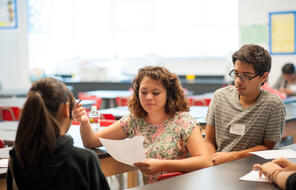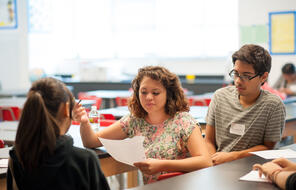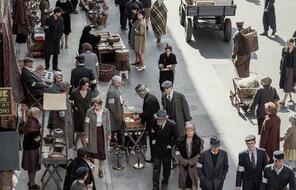Can a National Socialist Have Jewish Friends?
At a Glance
Language
English — USSubject
- History
- The Holocaust
The Nuremberg Laws and other anti-Jewish measures placed Jews outside Germany’s “universe of obligation”—those people who a society believes deserve respect and whose rights are worthy of protection. What does it mean to place an entire group of people outside that “circle”? Melita Maschmann, a classmate of Marianne Schweitzer (see reading, Discovering Jewish Blood), explained her behavior toward Jews in letters she wrote to Schweitzer after the war. In one letter, she wrote:
Rosel Cohn was a Jewish classmate of ours, but I did not really connect her with “the Jews.” Those Jews were and remained something mysteriously menacing and anonymous. They were not the sum of all Jewish individuals, who included yourself or old Herr Lewy [a Jewish neighbor]; they were an evil power, something with the attributes of a spook. One could not see it, but it was there, an active force for evil.
As children we had been told fairy stories which sought to make us believe in witches and wizards. Now we were too grown up to take this witchcraft seriously, but we still went on believing in the “wicked Jews.” . . . This wickedness was directed against the prosperity, unity, and prestige of the German nation, which we had learned to love at an early age. The antisemitism of my parents was a part of their outlook which was taken for granted. . . .
My parents certainly grumbled about the Jews, but this did not stop them from having a genuine liking for the Lewys and having social relations with my father’s Jewish colleagues.
For as long as we could remember, the adults had lived in this contradictory way with complete unconcern. One was friendly with individual Jews whom one liked, just as one was friendly as a Protestant with individual Catholics. But while it occurred to nobody to be ideologically hostile to the Catholics, one was, utterly, to the Jews. In all this no one seemed to worry about the fact that they had no clear idea of who “the Jews” were. They included the baptized and the Orthodox, Yiddish-speaking, second-hand dealers and professors of German literature, Communist agents, and First World War officers decorated with high orders, enthusiasts for Zionism and . . . German nationalists. . . .In preaching that all the misery of the nations was due to the Jews or that the Jewish spirit was [disloyal] and Jewish blood was corrupting, I was not compelled to think of you or old Herr Lewy or Rosel Cohn: I thought only of the bogey-man, “the Jew.” And when I heard that Jews were being driven from their professions and homes and imprisoned in ghettos, the points switched automatically in my mind to steer me around the thought that such a fate could also overtake you or old Lewy. It was only the Jew who was being persecuted and “made harmless.” 1
After joining the Nazi League of German Girls, Maschmann cut off her friendships with Jewish classmates. She saw it as her “duty” to do so “because one could only do one of two things: either have Jewish friends or be a National Socialist.” Historian Richard J. Evans has observed that although Maschmann did not actually take part in the many violent acts committed against Jews or the boycotts in Berlin, she considered those acts “justified”:
[She] told herself: “The Jews are the enemies of the new Germany . . . If the Jews sow hatred against us all over the world they must learn that we have hostages for them in our hands.” Later on, she suppressed the memory of the violence she had seen on the streets, and “as the years went by . . . grew better and better at switching off quickly in this manner on similar occasions. It was the only way.” 2
Evans notes, “A similar process of rationalization and moral editing must have taken place with many others too.”
Connection Questions
- Why do you think Melita Maschmann didn’t see Rosel Cohn, who was a Jew, as one of “the Jews”? What ideas or feelings influenced Maschmann to later choose National Socialism over her relationship with her friend?
- Maschmann describes the “contradictory way” she and her parents viewed Jews. How was it possible for them to maintain this attitude? How did this “contradictory” attitude shape her reactions when laws were passed to target German Jews?
- What does historian Richard Evans mean by “moral editing”? Why does Maschmann say it was “the only way”? What kinds of circumstances might make someone use this kind of “moral editing”?
How to Cite This Reading
Facing History & Ourselves, "Can a National Socialist Have Jewish Friends?," last updated August 2, 2016.








